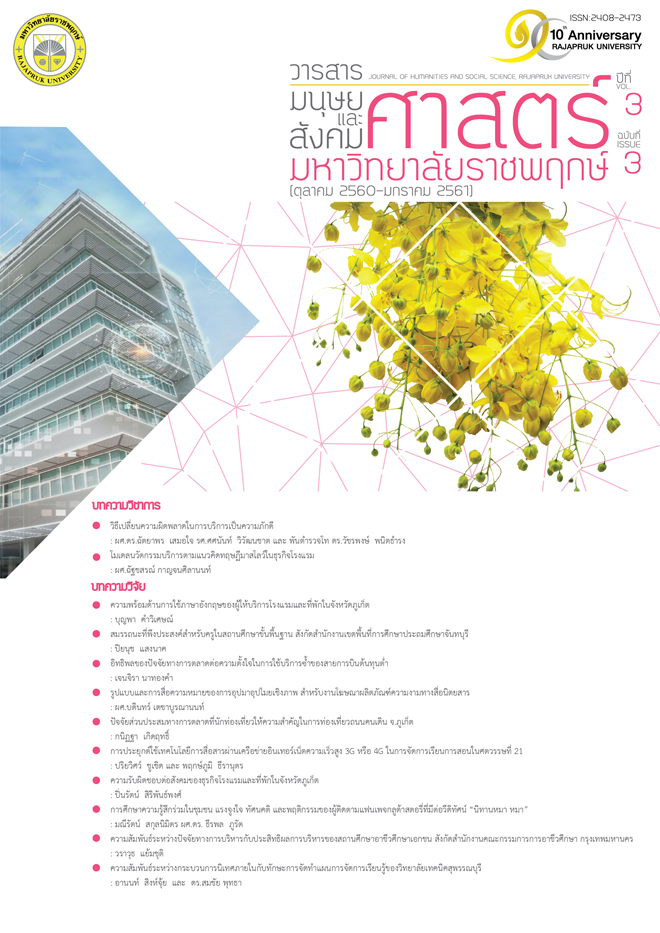ความพร้อมด้านการใช้ภาษาอังกฤษของพนักงานต้อนรับในโรงแรม และที่พักในจังหวัดภูเก็ต
Main Article Content
บทคัดย่อ
การวิจัยเรื่อง ความพร้อมด้านการใช้ภาษาอังกฤษของพนักงานต้อนรับในโรงแรม และที่พักในจังหวัดภูเก็ต มีวัตถุประสงค์เพื่อ 1) ศึกษาระดับความพร้อมด้านการใช้ภาษาอังกฤษของพนักงานต้อนรับโรงแรมและที่พักในจังหวัดภูเก็ต 2) เปรียบเทียบความพร้อมด้านการใช้ภาษาอังกฤษของพนักงานต้อนรับโรงแรมและที่พักในจังหวัดภูเก็ตตามปัจจัยส่วนบุคคล ระดับการศึกษา สาขาอาชีพ และที่ตั้งของโรงแรม การวิจัยครั้งนี้ใช้แบบสอบถามเป็นเครื่องมือในการวิจัย กลุ่มตัวอย่าง คือ พนักงานต้อนรับของโรงแรมและที่พักในพื้นที่จังหวัดภูเก็ตที่ขึ้นทะเบียนกับการท่องเที่ยวแห่งประเทศไทย จำนวน 280 แห่ง เป็นพนักงานต้อนรับ แห่งละ 1 คน ใช้วิธีการสุ่มอย่างง่าย (Simple Random Sampling) สถิติที่ใช้ในการวิเคราะห์ข้อมูล คือ ค่าความถี่ ร้อยละ ค่าเฉลี่ย (x̅) ส่วนเบี่ยงเบนมาตรฐาน (SD) และสถิติทดสอบที (t –test)
ผลการวิจัย พบว่า 1) ความพร้อมด้านการใช้ภาษาอังกฤษของพนักงานต้อนรับโรงแรม และที่พักในภูเก็ต โดยภาพรวมอยู่ในระดับมาก เมื่อพิจารณาแต่ละด้าน โดยเรียงลาดับค่าเฉลี่ยจากมากไปหาน้อย ได้แก่ ทักษะการอ่าน ทักษะการเขียน ทักษะการฟัง ทักษะพูด และความรู้ที่เกี่ยวกับวัฒนธรรม ตามลาดับ เมื่อพิจารณาเป็นรายด้าน พบว่า ด้านทักษะการฟัง โดยรวมอยู่ในระดับมาก ข้อที่มีคะแนนมากที่สุด คือ ข้อมูลเกี่ยวกับการจองห้องพักทางโทรศัพท์ ด้านทักษะการพูด โดยรวมอยู่ในระดับมาก ข้อที่มีคะแนนมากที่สุด คือ การบริการสิ่งอำนวยความสะดวกในโรงแรม ด้านทักษะการอ่าน โดยรวมอยู่ในระดับมาก ข้อที่มีคะแนนมากที่สุด คือ การอ่านคู่มือและคาอธิบายที่เกี่ยวข้องปัญหาและการขอความช่วยเหลือพิเศษในโรงแรม และการรับรู้คา ด้านทักษะการเขียน โดยรวมอยู่ในระดับมาก ข้อที่มีคะแนนมากที่สุด คือ การเขียนประกาศและการแจ้งเตือนของโรงแรมในชีวิตประจำวัน ด้านทักษะความรู้เกี่ยวกับวัฒนธรรม โดยรวมอยู่ในระดับปานกลาง โดยข้อที่มีคะแนนมากที่สุด คือ มารยาทและการปฏิบัติ ซึ่งเจ้าหน้าที่แผนกบริการส่วนหน้าต้องมีวิธีที่จะทำให้ผู้เข้าพักชื่นชมและรักที่จะมาเยือนเมืองไทย 2) ผลการเปรียบเทียบความพร้อมด้านการใช้ภาษาอังกฤษของพนักงานต้อนรับโรงแรมและที่พักในจังหวัดภูเก็ตจำแนกตามปัจจัยส่วนบุคคล ด้านระดับการศึกษา พบว่า โดยรวมระดับการศึกษาต่างกันทำให้มีความพร้อมระดับการใช้ภาษาแตกต่างกันอย่างมีนัยสำคัญทางสถิติที่ระดับ .05 โดยพนักงานที่มีระดับการศึกษาปริญญาตรีหรือสูงกว่าปริญญาตรีจะมีความพร้อมมากกว่าพนักงานที่มีระดับการศึกษาต่ำกว่าปริญญาตรี ปัจจัยส่วนบุคคลด้านพื้นฐานอาชีพ พบว่า ด้านทักษะการพูดแตกต่างกันอย่างมีนัยสำคัญทางสถิติที่ระดับ .05 โดยพนักงานที่สำเร็จการศึกษาวิชาการโรงแรมมีระดับความพร้อมด้านการใช้ภาษาอังกฤษด้านทักษะการพูดมากกว่าพนักงานที่สำเร็จการศึกษาในสาขาวิชาอื่น ปัจจัยส่วนบุคคลด้านสถานที่ทำงานที่ตั้งของโรงแรมและที่พัก พบว่าด้านทักษะฟัง ทักษะพูด ทักษะอ่าน ทักษะเขียน และความเข้าใจวัฒนธรรมด้านทั่ว ๆ ไปมีความแตกต่างกัน อย่างมีนัยสำคัญทางสถิติที่ระดับ .05 ได้แก่ พนักงานต้อนรับของโรงแรมริมชายหาดมีความพร้อมด้านการใช้ภาษาอังกฤษมากกว่าพนักงานต้อนรับของโรงแรมในเมือง
Article Details
เอกสารอ้างอิง
ฉัฐชสรณ์ กาญจนศิลานนท์. (2012). คุณภาพบริการ: ความจำเป็นของการพัฒนาคุณภาพบุคลากรในธุรกิจโรงแรม. Songklanakarin : E-Journal of Social Sciences & Humanities, 18(4). [Online] http://kaekae.oas.psu.ac.th/ojs/psuhsej/printarticle.php?id=992 & layout=ps
พรสวรรค์ อินทร์ปิ่น. (2543). ความสามารถในการใช้ภาษาอังกฤษเพื่อการสื่อสารของ พนักงานโรงแรมในจังหวัดพิษณุโลก. กรุงเทพฯ: ฐานข้อมูลวิทยานิพนธ์ไทย.
สุภิตา กาฬสินธุ์ และ นิสากร จารุมณี. (2558). ความจำเป็นในการใช้ภาษาอังกฤษของพนักงานต้อนรับส่วนหน้าของโรงแรม ในพื้นที่ท่องเที่ยวภาคใต้ของประเทศไทย ในการเข้าสู่ประชาคมเศรษฐกิจอาเซียน. วารสารศิลปศาสตร์ มหาวิทยาลัยสงขลานครินทร์.
สุวรรณา ตุลยวศินพงศ์. (2554). ลูกจ้างเหมาค่าแรง กม.ขยายคุ้มครองแต่เหลื่อมล้ำทางปฏิบัติ. http://prachatai.com/journal/2013/05/46841, 10/9/2559
อรุณี นะมะมุติ. (2542). การศึกษาการใช้ภาษาอังกฤษในการสื่อสารระหว่างพนักงานต้อนรับส่วนหน้าของโรงแรมกับลูกค้าชาวอาเซียน. กรุงเทพฯ: ฐานข้อมูลวิทยานิพนธ์ไทย.
CEFR (Common European Framework of References) for languages Retrieved from สืบค้นเมื่อ 9 มิถุนายน 2559. จาก www.uk.cambridge.org/elt on May 1, 2010
Downing and Thackrey. (1971). The Webster Dictionary of English Language. New York: Processsing and Books Inc.
Hersey, P. and Blanchard, K. H. (1969). Management of Organizational Behavior – Utilizing Human Resources. New Jersey: Prentice Hall.


